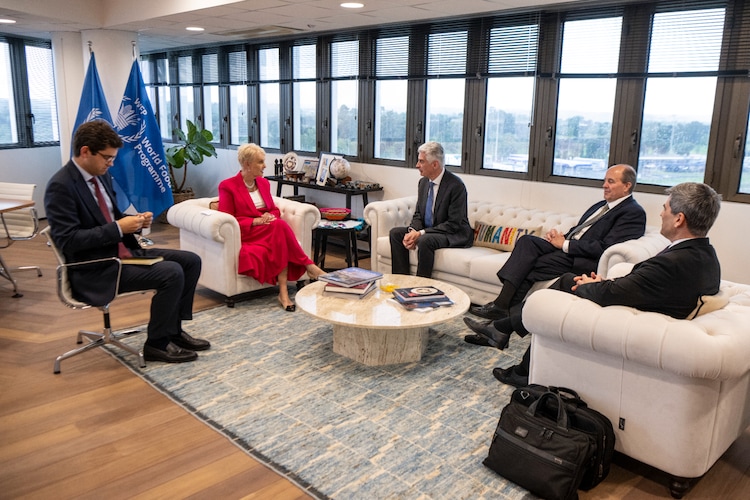The U.S. government may be cutting back on its commitment to foreign aid but The Church of Jesus Christ of Latter-day Saints isn’t.
As proof, the Utah-based faith sent Presiding Bishop Gérald Caussé — ecclesiastical overseer of the church’s global real estate, financial, investment and charitable operations — to the headquarters of the United Nations’ World Food Program in Rome last week.
While there, the French native and other church representatives met with the organization’s executive director, Cindy McCain, and her colleagues to discuss ongoing projects and areas of urgent need worldwide.
“By leveraging our combined resources and expertise,” Caussé said in a news release, “we are able to make a difference in the lives of those facing food insecurity.”

(The Church of Jesus Christ of Latter-day Saints) Presiding Bishop Gérald Caussé, middle, visits United Nations World Food Program Executive Director Cindy McCain, in red, at the agency's headquarters in Rome on Thursday, April 17, 2025.
The partnership originated in 2014 and has, according to the release, focused on providing immediate aid and building “long-term resilience” through investments in “nutrition, school meals and logistics.”
Speaking on behalf of the U.N. agency, Rania Dagash-Kamara, assistant executive director for partnerships and innovation, stressed that the collaboration between the two parties has “enabled us to make a tangible difference in the lives of millions.”
Included in the projects undertaken together are an emergency response hub in Barbados, completed last year, and a school meals program in Haiti, to which the church contributed $8 million in 2024. In 2022 alone, the faith donated $32 million to fund nutrient-dense meals for new and expectant mothers in 15 countries.
The church’s efforts to reinforce its partnership with the U.N. entity come at a time when the Trump administration has slashed its commitment to foreign aid, including to the World Food Program.
Earlier this month, The Associated Press reported that the administration had notified the organization that it was terminating money for projects in more than a dozen countries. A few days later, U.S. officials reversed course, announcing they would restore aid for all but Yemen and Afghanistan, two of the world’s poorest nations.
The church’s own U.S. membership is somewhat divided in its support of the U.N., a frequent target of conservative suspicion and ire.
Those concerns, however, don’t filter up to the faith’s top brass, which frequently teams up with the U.N. and its various agencies, including UNICEF.







